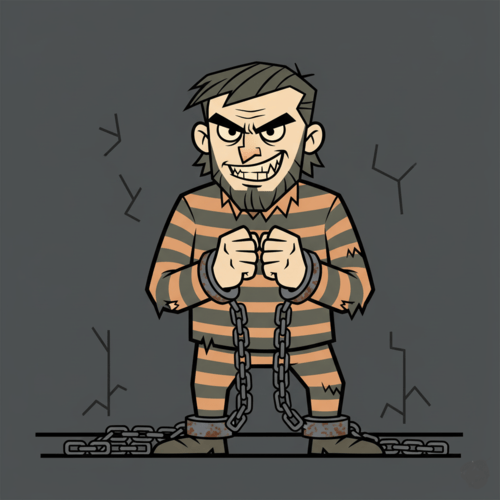What Does ‘Bondage of the Will’ Mean? Is It Biblical?
Imagine a prisoner who loves his chains—that’s the human will apart from grace. ‘Bondage of the will” is the biblical doctrine that sin has so corrupted every faculty of man that, left to himself, he cannot and will not choose God. This teaching strikes at the heart of our self-sufficiency and pride, yet it magnifies the stunning beauty of grace.
Far from being a relic of medieval theology, this doctrine pulses through Scripture. Understanding it transforms how we view salvation, evangelism, and the glory of God.
THE TESTIMONY OF SCRIPTURE: THREE PILLARS
The Bible doesn’t whisper about human inability—it shouts it from multiple angles.
- Romans 8:7–8 reveals hostility, not neutrality. Paul declares “the mind that is set on the flesh is hostile to God, for it does not submit to God’s law; indeed, it cannot. Those who are in the flesh cannot please God.” Notice the double negative: natural man does not and cannot submit. This isn’t mere difficulty—it’s impossibility. The unregenerate will isn’t neutrally weighing spiritual options at some cosmic buffet. It’s actively, instinctively hostile toward God. Every inclination runs away from Him, not toward Him.
- John 6:44 establishes the necessity of divine initiative. Jesus himself teaches, “No one can come to me unless the Father who sent me draws him.” The Greek word for “draws” (helkō) implies compelling force—the same word used for dragging a net full of fish to shore. Coming to Christ isn’t presented as a live option for the natural man; it requires supernatural intervention. We don’t drift toward Jesus. We don’t stumble upon Him. We must be drawn.
- Ephesians 2:1–3 uses the starkest language possible: death. Paul writes we were “dead in the trespasses and sins… following the prince of the power of the air… carrying out the desires of the body and the mind.” As Thomas Schreiner memorably puts it, “A corpse doesn’t cooperate with the undertaker.” Death here isn’t metaphorical weakness or spiritual drowsiness. It’s total inability. The dead don’t contribute to their resurrection—they receive it. They don’t assist the one bringing them back to life—they’re passive recipients of an entirely external power.
These passages converge on one unavoidable truth: apart from grace, we’re enslaved to sin, hostile to God, and spiritually dead—utterly incapable of choosing Him.
THE NATURE OF FREEDOM: WE CHOOSE WHAT WE LOVE
Here’s where many people stumble. The bondage of the will doesn’t mean we’re robots or lack the ability to choose. We choose constantly—what to eat, whom to marry, which career to pursue. Rather, the doctrine teaches our choices flow from our desires, and sin has corrupted those desires at the root.
RC Sproul crystallises this perfectly: “The will is free to choose what it desires, but not free to desire what it ought.” We always act according to our strongest inclination at any given moment. A lion is “free” to act like a lion, not a lamb. Fallen humanity is “free” to choose—but we always choose according to a sinful nature that loves darkness rather than light.
Jonathan Edwards argued true freedom means acting according to one’s nature. Before regeneration, our nature is comprehensively corrupted. We’re not neutral arbiters standing between good and evil, carefully weighing options. We’re slaves to sin (Romans 6:17, John 8:34). This isn’t external coercion—no one forces us to sin. It’s internal bondage. We sin because we want to. The prison door is locked from the inside.
The will is bound precisely because it functions according to fallen desires. Until those desires are transformed by the Spirit, God-ward choices remain impossible.
CONTEMPORARY VOICES: THE SCHOLARLY CONSENSUS
Leading Reformed theologians today defend this doctrine with philosophical precision and exegetical rigour.
John Piper emphasises grace precedes faith: “We are not free to choose God until He makes us willing.” Regeneration must come before faith because spiritually dead people lack the capacity to generate spiritual life. Grace doesn’t merely assist our choice—it creates the very possibility of choosing rightly. God doesn’t meet us halfway. He travels the entire distance.
Michael Horton defends monergism—the view that God alone regenerates the sinner. In The Christian Faith, Horton argues conversion isn’t cooperation between human will and divine grace but the sovereign work of the Spirit making alive what was dead. Salvation is God’s solo work from start to finish.
Thomas Schreiner and RC Sproul show how our total inability magnifies grace. If we contributed even 1% to our salvation, boasting would creep in. We’d become co-saviours with Christ. But because salvation is entirely God’s work—from election to regeneration to glorification—all glory belongs to Him alone. The doctrine of bondage doesn’t diminish grace; it’s the stage on which grace shines most brilliantly.
WHY THE OBJECTIONS FAIL
“This makes humans robots.” No, it makes us sinners. Robots have no desires; sinners have corrupt desires. God doesn’t override our will violently—He transforms it graciously. After regeneration, we freely, gladly, genuinely choose Christ. But we do so because He first changed our hearts.
“This destroys evangelism.” Actually, it fuels it. If conversion depends on human decision alone, evangelism becomes mere persuasion—a sales pitch. But if God alone opens blind eyes, we preach boldly knowing God will save His elect through His Word (Romans 10:14–17). We’re not begging people to let God save them. We’re proclaiming the gospel that God uses to resurrect the dead.
“But Scripture commands us to choose.” Commands reveal duty, not ability. “Be perfect” (Matthew 5:48) is a command, but who claims the ability to obey it perfectly? Commands expose our need for grace. They show us we’re sick so we’ll cry out for the Physician.
CHAINS BROKEN, GLORY MAGNIFIED
The doctrine of the bondage of the will humbles us utterly—and exalts grace infinitely. We were prisoners who loved our chains, corpses who couldn’t even cry for help. But God shattered our shackles by His sovereign mercy. He breathed life into dead lungs. He turned hearts of stone into hearts of flesh.
This doctrine doesn’t diminish human dignity; it locates dignity where it belongs—in the God who saves completely, freely, and forever. And it ensures that in heaven, no one will boast in their wisdom, their decision, or their faith. We’ll boast only in the Lord who chose us, called us, justified us, and will glorify us. That’s not bondage. That’s freedom.
RELATED FAQs
Why did Martin Luther write the book The Bondage of the Will? Arguably Luther’s most important theological work, the book was written in 1525 as a response to Erasmus. Luther argued the human will is enslaved to sin and cannot turn to God without divine intervention. Luther considered this book so crucial he said if all his other works perished, he’d want only The Bondage of the Will and his catechism to survive. The book became a cornerstone of Reformation theology and profoundly influenced Calvin, Edwards, and generations of Reformed thinkers.
- If we’re in bondage to sin, how can God hold us accountable? We’re accountable precisely because we sin willingly, not under external coercion. Jonathan Edwards explained moral responsibility is tied to the will, not to absolute autonomy. We choose according to our strongest desires, and those desires are sinful—but they’re still our desires. God doesn’t force us to sin; we love our sin. As Paul Helm notes in The Providence of God, accountability requires that our choices flow from our own character, which they do—that character just happens to be corrupted.
- How do Reformed counsellors apply this doctrine pastorally? Reformed counsellors like David Powlison (formerly of CCEF) used this doctrine to free people from the crushing burden of self-salvation. If we’re enslaved to sin, therapy techniques and self-help strategies can’t liberate us—only Christ can. This brings profound relief: we stop trying to bootstrap ourselves into holiness and instead rest in the finished work of Christ. Powlison emphasised bondage of the will doesn’t excuse sin, but it does explain why we need a Saviour every moment, not just at conversion.
Does bondage of the will mean Christians can’t make real choices? No. After regeneration, believers have a renewed will that genuinely loves God and chooses righteousness—though we still struggle with remaining sin. Sinclair Ferguson explains that regeneration doesn’t destroy the will but liberates it. Before salvation, we could only sin; after salvation, we can choose either righteousness or sin (though we’ll still sin until glorification). The difference is that Christians have a new nature that delights in God’s law, making truly God-glorifying choices possible for the first time.
- How does this doctrine affect evangelism and missions? It makes evangelism more confident, not less. Missionaries like William Carey and Adoniram Judson held firmly to this doctrine yet devoted their lives to reaching the lost. Why? Because they knew God’s sovereign grace guarantees success—His elect will be saved through the preaching of the gospel. JI Packer writes in Evangelism and the Sovereignty of God this doctrine frees us from manipulative tactics and anxiety about results. We proclaim Christ boldly, knowing God will awaken whom He wills.
- What’s the difference between “bondage of the will” and “free will”? It depends on how we define “free.” Reformed theology affirms we have a will and make genuine choices (we’re not robots). What we deny is libertarian free will—the idea that the will operates independently of our nature and desires. John Frame explains the will is always “free” in the sense that we do what we want, but it’s “bound” in the sense that what we want is determined by our nature. Before grace, our nature is enslaved to sin, so we freely choose evil. After grace, our nature is being renewed, so we can freely choose good.
How does the doctrine of bondage of the will relate to total depravity? Do they mean the same thing? They’re closely related but emphasise different aspects of our fallen condition. Total depravity (or “total inability”) describes the extent of sin’s corruption—it affects every part of us: mind, heart, will, and affections. Bondage of the will focuses specifically on the functional consequence for human choice—our will is so corrupted by sin that it consistently chooses against God. Think of total depravity as the diagnosis (the disease has spread everywhere) and bondage of the will as the prognosis (therefore, you can’t heal yourself). As RC Sproul notes, total depravity doesn’t mean we’re as bad as we could possibly be, but that sin has infected every faculty—including the will, which is why it remains in bondage until grace liberates it.
OUR RELATED POSTS
Editor's Pick

GPS Without Eyes: How Ants Silently Shout Intelligent Design
Picture a leafcutter ant navigating the rainforest floor in pitch darkness, carrying a leaf fragment 50 times its body weight. [...]

Born Broken: Why Must We Affirm Original Sin?
Imagine a world where we’re born neutral—free to choose good, and without a bias toward evil. Sounds appealing… until we [...]

Does God Truly Care About My Everyday Choices?
OWe believe God created the universe. We believe He orchestrated the exodus from Egypt and raised Jesus from the dead. [...]
SUPPORT US:
Feel the Holy Spirit's gentle nudge to partner with us?
Donate Online:
Account Name: TRUTHS TO DIE FOR FOUNDATION
Account Number: 10243565459
Bank IFSC: IDFB0043391
Bank Name: IDFC FIRST BANK






